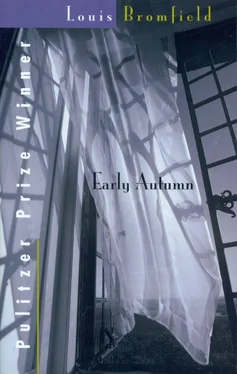Early Autumn: A Story of a Lady

for
Laura Canfield Wood
1
There was a ball in the old Pentland house, because for the first time in nearly forty years there was a young girl in the family to be introduced to the polite world of Boston and to the elect who had been asked to come on from New York and Philadelphia. So the old house was all bedizened with lanterns and bunches of late spring flowers, and in the bare, white-painted, dignified hallway a negro band, hidden discreetly by flowers, sat making noisy, obscene music.
Sybil Pentland was eighteen and lately returned from school in Paris, whither she had been sent against the advice of the conservative members of her own family, which, it might have been said, included in its connections most of Boston. Already her great-aunt, Mrs. Cassandra Struthers, a formidable woman, had gone through the list of eligible young men—the cousins and connections who were presentable and possessed of fortunes worthy of consideration by a family so solidly rich as the Pentlands. It was toward this end that the ball had been launched and the whole countryside invited, young and old, spry and infirm, middle-aged and dowdy—toward this end and with the idea of showing the world that the family had lost none of its prestige for all the lack of young people in its ranks. For this prestige had once been of national proportions, though now it had shrunk until the Pentland name was little known outside New England. Rather, it might have been said that the nation had run away from New England and the Pentland family, leaving it stranded and almost forgotten by the side of the path, which marked an unruly, almost barbaric progress away from all that the Pentland family and the old house represented.
Sybil’s grandfather had seen to it that there was plenty of champagne; and there were tables piled with salads and cold lobster and sandwiches and hot chicken in chafing dishes. It was as if a family whose whole history had been marked by thrift and caution had suddenly cast to the winds all semblance of restraint in a heroic gesture toward splendor.
But in some way, the gesture seemed to be failing. The negro music sounded wild and spirited, but also indiscreet and out of place in a house so old and solemn. A few men and one or two women known for their fondness for drink consumed a great deal of champagne, but only dullness came of it, dullness and a kind of dead despair. The rich, the splendorous, the gorgeous, the barbaric, had no place in rooms where the kind Mr. Longfellow and the immortal Messrs. Emerson and Lowell had once sat and talked of life. In a hallway, beneath the gaze of a row of ancestors remarkable for the grimness of their faces, the music appeared to lose its quality of abandon; it did not belong in this genteel world. On the fringes of the party there was some drunkenness among the undergraduates imported from Cambridge, but there was very little gaiety. The champagne fell upon barren ground. The party drooped.
Though the affair was given primarily to place Sybil Pentland upon the matrimonial market of this compact world, it served, too, as an introduction for Thérèse Callendar, who had come to spend the summer at Brook Cottage across the stony meadows on the other side of the river from Pentlands; and as a reintroduction of her mother, a far more vivid and remarkable person. Durham and the countryside thereabouts was familiar enough to her, for she had been born there and passed her childhood within sight of the spire of the Durham town meetinghouse. And now, after an absence of twenty years, she had come back out of a world which her own people—the people of her childhood—considered strange and ungenteel. Her world was one filled with queer people, a world remote from the quiet old house at Pentlands and the great brownstone houses of Commonwealth Avenue and Beacon Street. Indeed, it was this woman, Sabine Callendar, who seemed to have stolen all the thunder at the ball; beside her, neither of the young girls, her own daughter nor Sybil Pentland, appeared to attract any great interest. It was Sabine whom everyone noticed, acquaintances of her childhood because they were devoured by curiosity concerning those missing twenty years, and strangers because she was the most picturesque and arresting figure at the ball.
It was not that she surrounded herself by adoring young men eager to dance with her. She was, after all, a woman of forty-six, and she had no tolerance for mooning boys whose conversation was limited to bootlegging and college clubs. It was a success of a singular sort, a triumph of indifference.
People like Aunt Cassie Struthers remembered her as a shy and awkward young girl with a plain face, a good figure and brick-red hair which twenty years ago had been spoken of as “Poor Sabine’s ugly red hair.” She was a girl in those days who suffered miserably at balls and dinners, who shrank from all social life and preferred solitude. And now, here she was—returned—a tall woman of forty-six, with the same splendid figure, the same long nose and green eyes set a trifle too near each other, but a woman so striking in appearance and the confidence of her bearing that she managed somehow to dim the success even of younger, prettier women and virtually to extinguish the embryonic young things in pink-and-white tulle. Moving about indolently from room to room, greeting the people who had known her as a girl, addressing here and there an acquaintance which she had made in the course of the queer, independent, nomadic life she had led since divorcing her husband, there was an arrogance in her very walk that frightened the young and produced in the older members of Durham community (all the cousins and connections and indefinable relatives), a sense of profound irritation. Once she had been one of them, and now she seemed completely independent of them all, a traitress who had flung to the winds all the little rules of life drilled into her by Aunt Cassie and other aunts and cousins in the days when she had been an awkward, homely little girl with shocking red hair. Once she had belonged to this tight little world, and now she had returned—a woman who should have been defeated and a little declassé and somehow, irritatingly, was not. Instead, she was a “figure” much sought after in the world, enveloped by the mysterious cloud of esteem which surrounds such persons—a woman, in short, who was able to pick her friends from the ranks of distinguished and even celebrated people. It was not only because this was true, but because people like Aunt Cassie knew it was true, that she aroused interest and even indignation. She had turned her back upon them all and no awful fate had overtaken her; instead, she had taken a firm hold upon life and made of it a fine, even a glittering, success; and this is a thing which is not easily forgiven.
As she moved through the big rooms—complete and perfect from her superbly done, burnished red hair to the tips of her silver slippers—there was about her an assurance and an air of confidence in her own perfection that bordered upon insolence. There was a hard radiance and beauty in the brilliant green dress and the thin chain of diamonds that dimmed all of the others, that made most of the women seem dowdy and put together with pins. Undoubtedly her presence also served to dampen the gaiety. One knew from the look in the disdainful green eyes and the faint mocking smile on the frankly painted red mouth that she was aware of the effect she made and was delighted with her triumph. Wherever she went, always escorted by some man she had chosen with the air of conferring a favor, a little stir preceded her. She was indeed very disagreeable. …
Читать дальше













